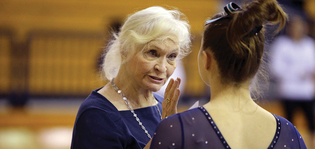
Yale Athletics
Barbara Tonry, head coach of women’s gymnastics for nearly 50 years, had an exceptional record of success at Yale—not only because of her deep knowledge, but also because she cared about her athletes.
View full image
Barbara Galleher-Tonry (1936–2021) didn’t live to see the gymnastics competitions of the 2020/2021 Olympics. She died on July 12, just 11 days before the cauldron was lit. But if she had survived long enough to watch the Games, surely she’d have been glued to her television, cheering Simone Biles on, exulting when Jade Carey won gold, and carefully analyzing every move that was successful and every move that wasn’t.
Barb, as many Yale students called her, was a born gymnast. When she was too young to participate in the National AAU Trampoline and Tumbling Championships, she participated anyway—in an exhibition (rather than a competition), winning first place (because she wasn’t old enough to win gold). But she collected a cascade of medals and honors as she worked her way up the gymnastics ladder. To name just a few: she earned a spot on the US Olympic training squad and a silver in the World Tumbling Championships. She was a finalist—not once, but twice—for the Sullivan Award, which is bestowed yearly on the top nonprofessional athlete in the country. She has a lasting place in the USA Gymnastics Hall of Fame.
In 1973, she got a call from Don Tonry, the men’s gymnastics coach at Yale. Women had finally been admitted to Yale College, and the gymnasts among them wanted to know who their coach was. The answer: nobody. But Don persuaded Barb to move to New Haven and take on the job. (They eventually married. By all accounts, it was a close partnership.) Don retired in 1980. Barb stayed on, into 2021. According to Yale Athletics, she holds the record for longest-tenured coach in NCAA gymnastics; according to the Gymnastics Hall of Fame, she “molded Yale’s women’s teams into one of the most successful teams in Yale’s history.” In her 48 years at Yale, her teams won 16 Ivy Classic championships, for a ratio of one in three.
In the early years of coeducation at Yale College, women athletes often had to fight for equipment, space, showers, and acceptance from the administration. Barb told the Yale Daily News in May of 2021 that her first students had had to buy their own equipment and make their own uniforms out of the men’s discarded swim uniforms. But there was strong camaraderie between the men and women gymnasts. Melinda Salata ’77 recalls that “those early years of gymnastics provided an oasis of equality in a newly coed university—the women and the men worked out together on a daily basis, and just as the Tonrys exemplified a good working relationship with each other, so too our two teams got along well. We helped each other, rooted for each other. I remember a lot of laughter.”
Esther Fong de Lory ’77 recalls Barb as a perfectionist who “paid extreme attention to detail. She would sometimes seem to be ‘all work,’ and effusive compliments were not her style.” But Esther adds that everyone knew “Barbara loved her job, the sport, and her gymnasts.” She “established a firm culture of ‘We are a team and we support each other, no matter what.’ She believed that if you were on the team, no matter your skill level, you were important. The benefit of that mindset was that the team worked together positively, with minimal contention and discord.”
“She really made me grow as a person,” says Jade Buford ’20. “She believed in us so much, even when we doubted ourselves.” At a meet, Barb would “grab our shoulders and say, ‘You’ve got this. Show them what you’ve got. Do this for yourself.’” And it worked. In her final tournament, Jade achieved the near-perfect score of 9.925.
In Jade’s junior year, Barb started a new custom: everyone who finished their routine during practice would put on funny sunglasses. Barb herself put the sunglasses on during a meet and walked around the place wearing them—surely a technique that helped her students relax. “She wanted to have fun with the girls, to be involved, to know their stories,” says Jade. “She took time to care.”
 loading
loading
1 comment
-

Graciela Trilla ’79, 10:58am August 19 2021 |  Flag as inappropriate
Flag as inappropriate
The comment period has expired.I have worshipped Barbara and Don for decades and always felt privileged to have been in their presence as a member of the Yale gymnastics team.
Barbara was more of a team manager, sympathetic adult presence, and constant during my years at Yale. Her assistants during my time were passive observers, and the gymnasts trained as solo practitioners when I was there. Her greatest assets were recruitment, eventually excellent training facilities, and attracting quality assistant coaches. Going to practice six days a week was a reprieve from the intensity of being a student of color at Yale in the late ’70s. However, I never felt prepared or "coached" to grow in any way.
I went on to coach club and elite gymnastics and to judge collegiate and regional competitions, and was an assistant coach myself at the University of Illinois until I went into urban public education and administration.
I always felt as though I had been a disappointment to Barbara. Her husband Don made me feel like I was a joke. I don't know why I stuck it out. I was billed as the Puerto Rican National Champion by the Tonrys but never felt challenged or guided. I felt used among a team of independent contractors.
It appears that the team became more cohesive and committed to one another in the last few decades. It would have been a great experience had a sense of collective camaraderie existed when I was there.